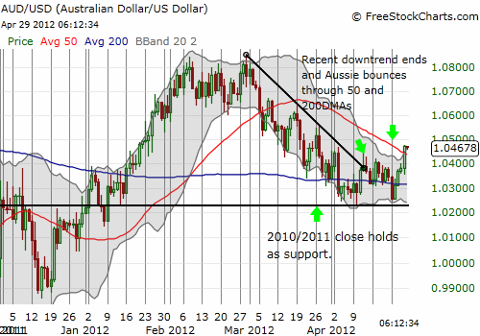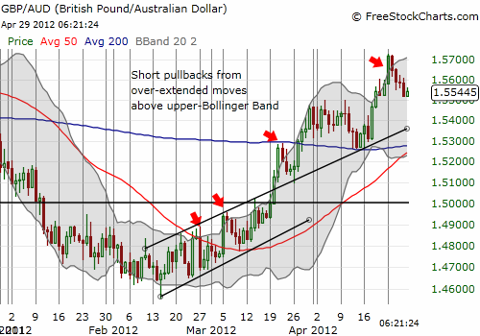One of my reasons for recently turning bearish on the Australian dollar (FXA) is what I see as the likelihood of additional rate cuts through the year. It seems the consensus has come around to this view as well.According to DailyFX, the market expects the Reserve Bank of Australia (RBA) to cut interest rates from 4.25 to 4.0% when it next announces monetary policy on the evening of May 1st (U.S. timezones). Despite these expectations, the Australian dollar has actually held firm going into this likely rate cut. In fact, against the U.S. dollar, the Australian dollar looks ready for another rally.
Australian dollar looks ready for a fresh rally against the U.S. dollar?
Over the past two weeks, the Australian dollar has also held steady against the Japanese yen (AUD/JPY) and Swiss franc (AUD/CHF). The Aussie has lost a lot of ground against the British pound (GBP/AUD), which has been my focus for making bearish bets. In my last post on the this currency pair, I pointed out how the last big surge would give way to a pullback. Now that the pullback has unfolded, I am quickly rebuilding my long GBP/AUD position on the weakness. I have retained long positions in AUD/USD, AUD/JPY, and AUD/CHF (the recent relative calm in these pairs has made it easier to hold and collect gains on the rate differentials).
The British pound continues to gain against the Australian dollar
Source for charts: FreeStockCharts.com
Note well that the upward slope of the previous trading channel has served as firm support for the pounds advance over the last month. This was particularly critical when GBP/AUD retested the 200DMA along with this upward trendline two weeks ago. If the pair slips further for some reason, I expect the upward trendline to hold again. I do not expect such a retest because it seems that traders are increasingly turning to the pound as a safehaven from eurozone drama.
Alice Ross from the Financial Times makes this claim in "Pound wins from unlikely haven status." I am highly skeptical that such a haven status can last, especially when the Bank of England does not want a strong currency while the U.K. economy continues to struggle, but I will save that critique for another post.


0 comments:
Post a Comment